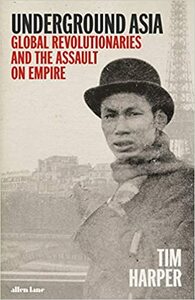Take a photo of a barcode or cover
5 reviews for:
Underground Asia: Global Revolutionaries and the Overthrow of Europe's Empires in the East
Tim Harper
5 reviews for:
Underground Asia: Global Revolutionaries and the Overthrow of Europe's Empires in the East
Tim Harper
This book has probably 100 characters and Harper doesn't seem to notice that it's impossible to keep track of them. There's kind of a big reveal in the last 15 pages about one of his three main characters that is legitimately shocking and interesting, but the 97 other characters just kind of disappear into the swamp. Some of this is deliberate, but it feels kind of dehumanizing, too: I know these guys are in the underground, but should they also be underground to me, especially when they're going to get killed or tortured in an island prison?
This did make me rethink a lot of what I thought I knew about revolutionary anti-colonialist movements; it's legitimately very cool that students in Shanghai in the 1920s liked Lenin more than any other figure in their country, it's cool to understand more about the internicine leftist feuds in India, to imagine how scary the masses of the archipelago of Southeast Asia were to their colonialist overlords, to remember that the U.S. was also a colonialist power. But 650 pages of it is obviously way too much.
This did make me rethink a lot of what I thought I knew about revolutionary anti-colonialist movements; it's legitimately very cool that students in Shanghai in the 1920s liked Lenin more than any other figure in their country, it's cool to understand more about the internicine leftist feuds in India, to imagine how scary the masses of the archipelago of Southeast Asia were to their colonialist overlords, to remember that the U.S. was also a colonialist power. But 650 pages of it is obviously way too much.
One of the best books I've read in a long time! Does *such* a good job of, among many things, connecting *individual* biographical details with the broader arc of social movements -- for example: Ho Chi Minh's own life is placed in context so well with other less-well-known Indochinese revolutionaries, not to mention their pursuit by French intelligence, and the even broader context of WWI and fascism, etc... just a masterpiece imo. I'm sad bc it's exactly the book I wish I could've written for my dissertation :P
informative
reflective
medium-paced
informative
inspiring
medium-paced
challenging
informative
slow-paced


